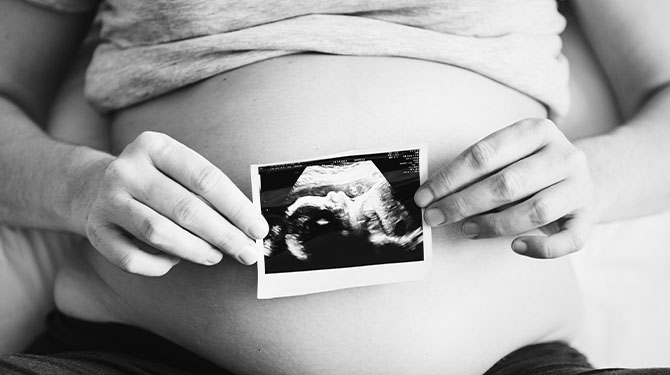Closures and Delayed Openings
To view our list of weather-related closures and adjusted hours, please visit our closings page.

Throughout your pregnancy, several tests are required to monitor your baby’s health and check for or manage medical complications.
You may receive your tests at your OB/GYN or midwife’s office, or if your provider doesn’t offer a needed test, you may be referred to a fetal testing center.
You can be tested at our fetal testing units no matter where you plan to deliver your baby. We will communicate the results of your test(s) to your provider as soon as possible.
Below is a brief overview of the tests offered at our hospitals:
| Test | What It Does | When It is Given |
|---|---|---|
| Common for All Pregnancies | ||
| First Trimester Screening Includes a maternal blood test and an ultrasound | Estimates the risk for Down’s Syndrome & chromosomal abnormalities | Between 11 and 14 weeks |
| Ultrasound | Determines the gestational age & fetal growth and well-being | First, second and third trimesters |
| Biophysical Profile (BPP) Includes an ultrasound, non-stress test, and amniotic fluid index | Evaluates the health of the fetus by monitoring activity, body and breathing movements, fetal tone, and amniotic fluid levels | Third trimester, or by 32 to 34 weeks for a high-risk pregnancy |
| Ordered When Needed | ||
| Non-Stress Test (NST) | Uses external fetal monitors to track the baby’s heart rate and measure uterine contractions. It is performed when there is suspicion that the placenta may not be functioning well. | Last trimester of pregnancy, or by 32 to 34 weeks for a high-risk pregnancy |
| Fetal Echocardiography Includes ultrasound | Studies the baby’s heart in detail and is ordered when a heart defect is suspected | Between 20 and 22 weeks |
| Amniocentesis Includes ultrasound | Tests for genetic disorders such as Down’s Syndrome or birth defects such as Spina Bifida | Between 15 and 20 weeks for women who are at an increased risk of chromosome abnormalities, such as women who are over the age of 35 or who have had an abnormal maternal serum screening test |
| Cell-Free Fetal DNA Testing | Screens for an increased risk of Down syndrome (trisomy 21), Edward syndrome (trisomy 18) and Patau syndrome (trisomy 13).
If the screening is positive, genetic amniocentesis should be offered to confirm a positive test. The screening may be given to women who have an increased risk for Down syndrome or trisomy 18, based on standard screening tests or previous pregnancies with chromosome problems. It may also be given if an abnormality is found by ultrasound, and invasive testing, such as a genetic amniocentesis, is declined. |
After 10 weeks for women who are at least 35 years old |
Please bring your prescription, your insurance card, and your license ID. Your copay is due at time of service.
For the latest visitor guidelines, please click here.
Although testing time can vary by procedure, your testing will probably take about one hour.
We offer consultations for high-risk pregnancies, multiple gestation, previous pregnancy loss, and advanced maternal age.
If you suspect that your pregnancy is at risk for complications, please contact us to make an appointment.